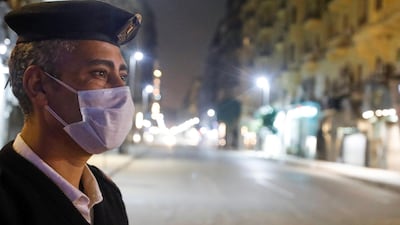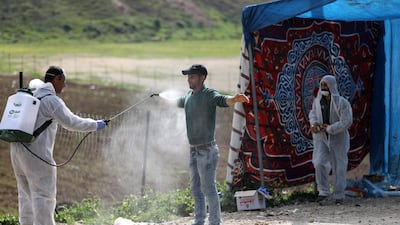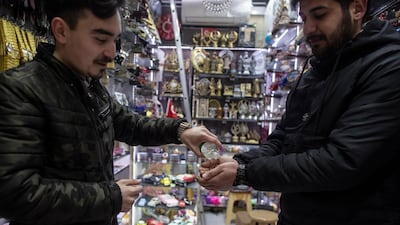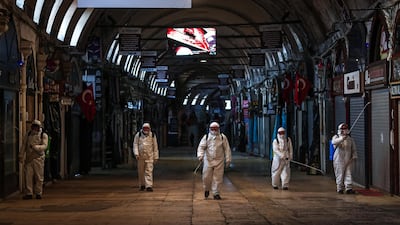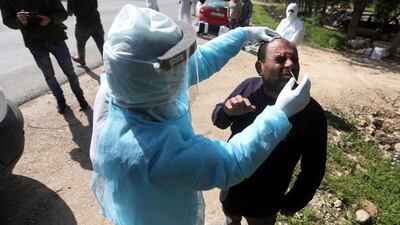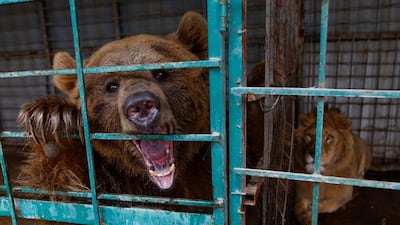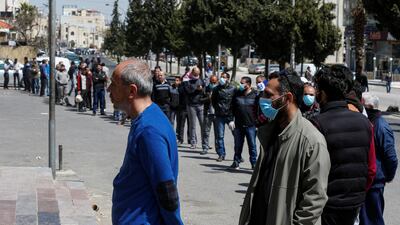The Lebanese government announced that it would distribute 100,000 food and hygiene packages worth 18 billion Lebanese Pounds (Dh 44 million) to the country’s neediest families in a bid to help ease the impact of strict measures taken to fight the spread of the coronavirus, which has so far killed 6 people in the country.
Lebanon’s working-class largely rely on daily work and informal employment and have been hard hit by a nationwide lockdown that has prevented them from earning a wage.
“A lot of people lost their jobs, especially people paid on a daily basis,” said Lebanese MP Issam Araji, who heads the Parliament’s Public Health, Labour and Social Affairs Committee. "We need more than this, but we’ll start initially with 100,000."
Local studies show that hundreds of thousands of Lebanese were fired months before the coronavirus pandemic because of an unprecedented economic crisis that caused massive protests all over the country.
In early March, the government announced that Lebanon would default on its debt for the first time ever. The Lebanese Pound has lost around 70 per cent of its value on the black market and dollars are hard to come by in cash-strapped Lebanese banks.
On Tuesday, a taxi driver set his car alight in Beirut after he was fined by police for not complying with new rules to fight the coronavirus, which includes not driving with more than two passengers in one car. With little in the way of effective public transport, much of the country relies on shared taxi services for a small set fee to get around.
While the government is looking to step up support, its means are limited by the country’s worst financial crisis since the civil war.
"The coronavirus started during a financial and economic crisis, so the government does not have enough cash money in dollars to buy PCR machines [for testing] and ventilators. We are really in a critical situation," Mr Araji told The National. The total number of coronavirus cases in the country currently stands at 307.
Aid packages, which are expected to be distributed in “one to two weeks”, said Mr Araji, will include high-calorie food and disinfectant material. Prices of hand sanitising gel have recently skyrocketed.
Asked how the government would finance the aid package, Mr Araji said he was unsure.
“It could be from the central bank or an international food bank,” he answered. The Social Affairs Ministry will face “a big problem” if the crisis lasts several months, he added.
Government budgets have already been slashed in a bid to tackle the third-highest debt to GDP ratio in the world.
The aid package was announced on Wednesday afternoon during a press conference attended by Mr Araji and Social Affairs Minister Ramzi Msharrafieh, who said that the army would package, sterilise and distribute the food and hygiene aid.
This was the first social aid measure announced by the Lebanese government since all shops – excluding grocery stores and pharmacies – were ordered to shut on March 15, a few weeks after schools closed.
However, Lebanese media have reported that local NGOs and municipalities have started distributing food on a smaller scale.
On Wednesday, Lebanese party Hezbollah also unveiled its plan to fight coronavirus, which was announced by its leader Hassan Nasrallah in a speech on March 20.
The party said it has mobilised "24,500 people (doctors, nurses and aid workers) to implement Hezbollah's anti-coronavirus plan," Hashem Safieddine, who heads the influential party's executive council, told television channel Al Manar. The party has so far spent 3.5 billion Lebanese pounds on the coronavirus crisis, he said.
